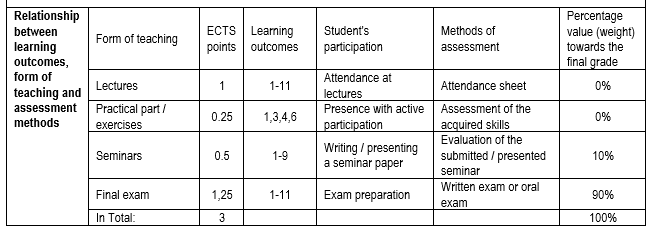Students are provided with basic knowledge on microbiology, parasitology and infectology, as well as biological features of microorganisms that cause infections, on routes of transmission and defence mechanisms from infections.
Depicting basic groups of antimicrobial medication and their spectrum of effects, mechanisms of effects on bacterial cells and mechanisms of bacterial resistance to the antimicrobial medication.
Enabling insight into the basic procedures of micro-bacterial diagnostics with special emphasis on microbiological analysis of clinical samples, on principles of proper and safe laboratory work.
Provide students with ways of preventing hospital infections.
Microbiology and parasitology. Basic biological features of the most important microorganisms and parasites that cause infections of individual organ systems in the human body; routes of transmitting infections caused by microorganisms among people; possibility of applying antimicrobial medication in treating certain infections; basics on microbiological diagnostics of infections of individual organ systems; proper ways of taking samples for microbiological analysis; ways of preventing and protecting from hospital infections; application of different methods of microbiological diagnostics in the laboratory.
General infectology.Intestinal infectious diseases. Streptococcus diseases, anginas, Purulent meningitis, Meningococcal diseases, staphylococcus diseases. Bacteraemia, sepsis. Rickettsia infections, mycoplasma infection, chlamydia. Sexually transmitted diseases, hospital infections. Tetanus, whooping cough, leptospirosis. Viral rash diseases, mumps (after vac.). Influenza, viral respiratory infections. Enteroviruses, serous meningitis. Infectious mononucleosis syndrome. Viral hepatitis, HIV, viral herpes infection. Parasitic diseases.
Obavezna literatura:
- Begovac J, i sur. Infektologija. Zagreb: Profil International; 2006.
- Kalenić S, i sur. Medicinska mikrobiologija. Zagreb: Medicinska naklada; 2013. (izabrana poglavlja)
Dopunska literatura:
- Damani NN. Priručnik o postupcima kontrole infekcija, prijevod 2. izd. Zagreb: Merkur A.B.D.; 2004.
- Kuzman I, Schönwald S. Infektologija. Zagreb: Medicinska naklada; 2000.
Upon completion of this course, students will be able to:
1. identify the properties of microorganisms that cause infectious diseases in humans, their pathogenicity factors and modes of transmission;
2. use the acquired knowledge on the basics of human immune defense against infection;
3. identify the mode of action of antimicrobial agents and the mechanisms of resistance of microorganisms to these agents;
4. recognize and apply the basic principles of proper and safe laboratory work;
5. explain and apply methods of prevention of nosocomial infections;
6. explain the basics of laboratory diagnostics of pathogenic microorganisms and parasites;
7. apply the acquired knowledge in the correct selection of the place for taking a clinical sample, proper sampling and transport or storage of samples to the microbiological laboratory;
8. argue knowledge of general infectology and infectious diseases;
9. use new knowledge from infectology in nursing care with an infectological patient;
10. develop an integrated approach to health and disease and look at the cell and the organism as an integrated system;
11. interpret pathophysiological changes induced by microorganisms.



